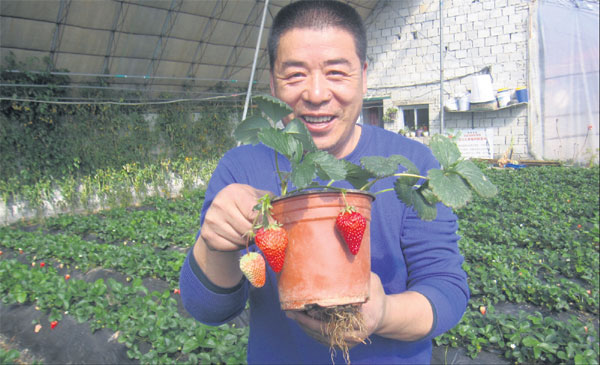The sweet taste of success
|
GE SHUJING, founder of Gaoqiaolyuye strawberry cooperative in Donggang, Liaoning province, runs a 12-hectare strawberry farm that employs more than 100 local farmers. Provided to China Daily |
Strawberry entrepreneur grasps the opportunity to cater to urban demand
It's a warm afternoon and Ge Shujing is tending strawberries in his greenhouse.
As the founder of Gaoqiaolyuye strawberry cooperative, he is now running a 12-hectare strawberry farm that employs more than 100 local farmers, with revenue that reached 5.5 million yuan ($800,000, 750,000 euros, £650,000) last year, according to Ge.
Five years ago, he worked at a construction site on the outskirts of Dandong, in Northeast China's Liaoning province, just like hundreds of millions of other migrant workers in China. His yearly pay was nearly 50,000 yuan, and there was little time to be with his family.
"I noticed that fresh strawberries were popular in the shopping mall, and my hometown, Donggang, Liaoning, has long been famous for strawberries. I thought maybe I could do that business," he recalls.
Ge started from one small greenhouse and his business expanded rapidly in the following years as China's consumption boomed.
"One greenhouse can generate up to 150,000 yuan annually, which triples my past income in the city," says Ge. "Moreover, I can also support my elderly mom and small kids now."
Donggang is one of the biggest strawberry production bases in China because of its gentle and wet climate. Last year, its strawberry cultivation area reached 12,666 hectares. Total output reached 470,000 tons and revenue touched 4.9 billion yuan.
"Donggang strawberry" has been registered as a famous fruit brand.
With the nation's internet upsurge and consumption increase, many farmer pioneers like Ge have embraced e-commerce and have even become pacesetters, leading neighbors to transform resource advantages into business advantages. More than 90,000 farmers have engaged in agricultural e-commerce, according to the local Donggang government.
Industry insiders forecast that the central government will keep optimizing policies and services for such businesses in order to improve farmers' incomes, which is always at the top of the agenda for the Chinese government.
A general manager from a well-known e-commerce platform, who did not want to be named, says that he plans to build up to 1,500 village outlets in the countryside of Liaoning province to help local farmer-entrepreneurs sell their rice, apple and even wig hair to national consumers. "We will focus on e-commerce education and on the establishment of a partner network and logistics system, which are vital for the sustainability of the business," he says.
Ge, whose strawberries are mainly sold to first-tier cities and provincial capitals, such as Shenyang, Hangzhou and Qingdao, confirms the critical importance of e-commerce.
"WeChat and Taobao are two major sales platforms for me," says Ge. "Most of my clients were born after the 1980s. They are tech-savvy and internet-aware. Once they try my strawberries, they share with their friends via social media. My reputation grows."
Mao Donghui, who leads the X-lab at Tsinghua University, praises such innovation and business startups. However, she says farmers are vulnerable to the fast-changing market, so they need to develop skills and have access to financial support.
Song Ximei, an information officer of Dandong municipal government, says a series of supportive policies have been launched - from micro-finance and internet services to optimization of roads.
"In a month, the strawberry planting season will end, so I am planning to go for training in e-commerce and social media marketing," says Ge.
Zou Yumeng contributed to this story.
wuyong@chinadaily.com.cn










